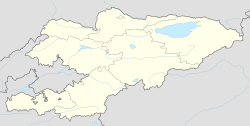Sumsar
Sumsar
Сумсар | |
|---|---|
| Coordinates: 41°18′0″N 71°18′36″E / 41.30000°N 71.31000°E | |
| Country | Kyrgyzstan |
| Region | Jalal-Abad Region |
| District | Chatkal District |
| Urban-type settlement | 1952 |
| Elevation | 1,328 m (4,357 ft) |
| Population (2021)[1] | |
| • Total | 2,802 |
| Time zone | UTC+6 |
Sumsar is a village in Chatkal District of Jalal-Abad Region of Kyrgyzstan.[2] Its population was 2,802 in 2021.[1] Until 2012 it was an urban-type settlement.[3] It is situated in the foothills of the Chatkal Range.[4]
A lead and zinc mine was located in Sumsar. The mine was exploited by the Sumsar company who also operated a uranium mine in neighbouring Shekaftar. The company left behind three huge tailings site containing toxic waste: Most of Tailings No. 1 have slipped into the Sumsar river. Tailings No. 3 have never been covered, leaving a fine dust exposed to the wind. Tailngs No. 2 is also in need of repairs. The mill tailings of the lead and zinc milling in Sumsar and the low-grade uranium ore heaps in Shekaftar need an urgent remedial action because the legacy sites became chronic sources of toxic and radioactive contaminants for the Sumsar-Say River. The legacy sites are approximately 10–15 km upstream from the northern fringes of the Fergana valley that belongs to the most important agricultural areas of Soviet Central Asia.[5]
In early 2016, a joint mission by the NGO Swiss Foundation for Mine Action (Fondation Suisse de déminage, FSD) and the Kyrgyzstan Emergency Situations Ministry found that the former Sumsar lead and zinc mining and ore processing area is located in an ecologically very sensitive environment and represents a constant threat of elevated exposures to chemical contaminants for the resident populations in the Sumsar valley.[6]
Population
[edit]| Year | Pop. | ±% p.a. |
|---|---|---|
| 1970 | 4,219 | — |
| 1979 | 3,836 | −1.05% |
| 1989 | 5,811 | +4.24% |
| 1999 | 5,368 | −0.79% |
| 2009 | 5,967 | +1.06% |
| 2021 | 2,802 | −6.10% |
| Note: resident population; Sources:[7][1] | ||
References
[edit]- ^ a b c "Population of regions, districts, towns, urban-type settlements, rural communities and villages of Kyrgyz Republic" (XLS) (in Russian). National Statistics Committee of the Kyrgyz Republic. 2021. Archived from the original on 10 November 2021.
- ^ "Classification system of territorial units of the Kyrgyz Republic" (in Kyrgyz). National Statistics Committee of the Kyrgyz Republic. May 2021. pp. 30–31.
- ^ Law 27 September 2012 No. 168 on the transformation of individual urban settlements of the Kyrgyz Republic and relating them to the category of village or city
- ^ Сумсар in the Great Soviet Encyclopedia (in Russian) – via Great Scientific Library
- ^ "The Mining Legacies of Sumsar and Shekaftar and their Impact in the Sumsar / Rezak Say Watershed. Proposed Remedial Measures" Isakbek Torgoev and Alexander Jakubick 2014. Retrieved October 9, 2016
- ^ "Environmental mission advises Kyrgyzstan on mine rehab strategy" Ilan Solomons, Cramer Media Staff Writer, in the Mining Weekly, March 11, 2016. Retrieved October 9, 2016
- ^ "2009 population and housing census of the Kyrgyz Republic: Jalal-Abad Region" (PDF) (in Russian). National Statistics Committee of the Kyrgyz Republic. 2010. p. 303.

